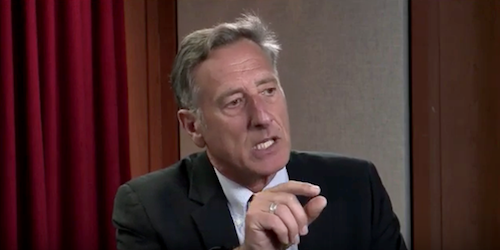Sanders Refuses To Answer For Failed State-Level Medicare For All In Vermont

WASHINGTON – On the debate stage in Miami last week, both NBC News moderator Lester Holt and Senator Michael Bennet (D-Colo.) pointed out to Senator Bernie Sanders (I-Vt.) that an effort to implement a Medicare for all-style system in Sanders’s home state of Vermont failed “when it became clear that people would not support the tax increases needed to sustain such a program,” as The New York Times editorial board noted recently.
“Because of those taxes, Vermont rejected Medicare for all,” Bennet said, while Holt reminded Sanders: “…[Y]ou basically want to scrap the private health insurance system as we know it and replace it with a government run plan. None of the states that have tried something like that – California, Vermont, New York has struggled with it – have been successful.”
Sanders refused to address the failure of Medicare for all in Vermont directly, but Roll Call reports that the state’s Democratic former Governor Peter Shumlin, who campaigned on the proposal, admitted that the 11.5 percent payroll tax and 9.5 percent income tax proposed to finance the system were too much for taxpayers: “The final bill was too much for the state to bear, he said. ‘The biggest problem was money,’ Shumlin said … And he couldn’t promise lawmakers that they wouldn’t need to hike taxes again later to accommodate rising health care costs. ‘I couldn’t with a straight face turn to them and say, no, we’ve got this figured out,’ he said.”
To Watch Gov. Shumlin’s Remarks, Click Here Or On The Screenshot Above
The Washington Post reports that the Vermont failure “offers sobering lessons for the current crop of Democrats running for president, including Vermont’s own Sen. Bernie Sanders (I), most of whom embrace Medicare-for-all,” adding: “Then as now, many of the advocates shared ‘a belief that borders on the theological’ that such a system would save money, as one analyst put it – even though no one knew what it would cost when it passed in Vermont. That belief would prove naïve.”
When it comes to a national Medicare for all system, the nonpartisan Committee for a Responsible Federal Budget (CRFB) finds that even a low-end cost estimate of $30 trillion over a decade “would mean increasing federal spending by about 60 percent (excluding interest)” and “require the equivalent of tripling payroll taxes or more than doubling all other taxes.”
And while Sanders has repeatedly claimed that under Medicare for all, the “vast majority of the people in this country will be paying significantly less,” as he declared on the debate stage last Thursday night, Bloombergreports this week that “[f]or many Americans, though, that would not be true,” and “higher taxes would exceed any savings.” They write:
Yet the 181 million taxpayers with employer-sponsored coverage could miss out on the benefits of the Sanders plan, and even those receiving Medicaid could pay more, according to health-care policy experts on both sides of the political spectrum … Sanders’s Senate office did not immediately respond to a request for comment … Sanders has proposed a wealth tax, a bank levy and premiums paid by employers and employees. But that only raises about half of what is needed, meaning that payroll taxes and income tax increases would necessarily have to be part of the plan. “There are likely to be a lot more losers than winners,” Brian Riedl, a senior fellow at the right-leaning Manhattan Institute. “It’s hard to do the tax shift without making most families losers.” … Many of the 181 million taxpayers with employer-sponsored coverage are likely to see their taxes go higher than their current health care spending, because about 56% of their medical costs are covered by their company, according to the Milliman Medical Index, which tracks annual health care spending. For example, a person making $50,000 with employer-sponsored coverage spends about $5,250 annually on health care, meaning that under Sanders’s plan, her or his taxes would be nearly double the person’s current health care costs … Those on Medicaid, the government-sponsored insurance program for the poor, are likely to see their tax burdens rise far beyond their current health spending, Riedl said. A family of four earning $30,000 spends about $1,200 annually on health costs, according to the Kaiser Family Foundation estimates. Sanders’ plan also assumes that health providers will be reimbursed at Medicare rates, about 40% below what they receive from private insurers. Health care experts question whether a cut this large is feasible, meaning that the cost for Medicare for All could be even higher.
In examining Sanders’s “misleading” rhetoric, The Washington Post’s fact checkers note that a study by the left-leaning Urban Institute finds that “Sanders’s proposed tax increase would be insufficient and that additional revenue would be needed,” while CNN reports that “[t]ax experts … say that you can’t raise enough money from taxing the rich and that the levies on all Americans may exceed the savings for more people than Sanders expects. This may be particularly true of low-income folks who get heavily subsidized coverage on the Obamacare exchanges … Sanders hasn’t provided a comprehensive analysis of how much the plan … will cost or how he will pay for it … ‘His plan still doesn’t add up,’ [Marc] Goldwein [of the Committee for a Responsible Federal Budget (CRFB)] said … ‘To generate the kind of revenue that Sanders is talking about to pay for something as big as his version of Medicare for All … would be vastly more expensive than any of the kinds of things he’s talking about,’ said Howard Gleckman, senior fellow at the Urban-Brookings Tax Policy Center, a nonpartisan think tank. ‘He’s going to have to come up with more money from some place.’”
“There’s no possible way to finance [Medicare for all] without big middle class tax increases,” CRFB’s Goldwein explained to The Washington Post. And while Sanders insists that “a lot of people in the country would be delighted to pay more in taxes” to bankroll his one-size-fits-all health care system, a national poll by the Kaiser Family Foundation revealed that 60 percent oppose Medicare for all when they learn it would require most Americans to pay higher taxes.
Notably, it was also acknowledged on the debate stage last week that so-called “moderate” alternatives to Medicare for all – new government insurance systems such as “buy-in” and “public option” – are designed to produce the same result: a one-size-fits-all health care system run by Washington, and as such would ultimately present Americans with the same high costs, unaffordable tax increases, and diminished access to high-quality health care.
###
